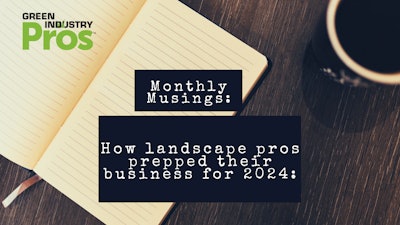
One landscape professional says he recommended building a budget and people planning. Another suggests trying to have enough cash on hand to pay for new equipment without financing. Another advises focusing on your own business rather than everyone else's business around you.
All of these words are wisdom stemmed from the question: What's your best advice for preparing your company for 2024?
Green Industry Pros received these responses while conducting interviews for our annual State of the Industry Report and from our new monthly segment called Monthly Musings, where we ask a question inspired by readers, and other readers respond with their solutions.
(Editor's Note: Check out our next installment of Monthly Musings, where we ask readers how they plan to stack their bench for the 2024 season.)
Let's dig into other responses from landscape pros and discuss why they're so important.
Invest in your people
As the industry continues to struggle to fill the labor gap (in fact, our next Monthly Musings question is on that topic), the next piece of advice proved to be timely as well. Invest in your people.
“Take good care of your employees," says Peter Lucadano, co-owner and CEO of RedTree Landscape Systems headquartered in Holiday, Fla. "Nothing happens in your business if you don't retain and encourage a positive, caring culture."
He adds that if companies don't take care of their employees, they won't take care of clients, and the cycle becomes systemic.
"After almost 40 years in the industry, I've seen many companies fail," Lucadano says. "They have all the investment in the world and are all about great business ideas, but they have all this equipment without great people to run the equipment and put forth the extra effort to go the extra mile and take care of customers."
Know your numbers
People aren't the only important aspects of a business. Knowing your numbers is just as important. In fact, Adam Linnemann, co-owner and co-founder of The Green Executive, recently discussed this on a segment of The TURN podcast.
Edward Arens, owner at E&M Outdoor Services in Monticello, Minn., shared the same idea.
"Have your numbers dialed in," Arens says. "It gives you a more confident price structure and allows you more room to adjust going into the next season for equipment purchases and cash flow. Cash flow is king in this business, and profit is right there with cash flow."
Decide on an operating system
It's no secret that having a standard operating procedure (SOP) streamlines the business and boosts efficiency—but it has to be done the right way.
The process is a lot easier if companies stick it out with one SOP instead of jumping around from one to the next, causing headaches for staff and potential chaos for customers.
Joshua Malik, president of Joshua Tree Experts in Stockerton, Pa., relayed the same thing when asked about his advice for other landscape pros.
"What I really wish I would've done 18 years ago was developed and stuck with one operating system," Malik says. "That's something that helps you build a business plan, where you can identify your one-year plan, your three-year picture, your 10-year target, and where you're setting goals to meet these milestones along the way."
He adds that having a standard operating procedure helps companies build out their values within their business, identify their target market and decide who they're going to market to and how they're going to market to those types of people.
He says it's equally important to develop a leadership team that helps carry out decisions, rather than only the owner doing so.
"It's really hard as the company grows for the owner to be the only one making decisions," Malik says. "Get your people involved. Creating that vision together is something that's been the most successful for me."


![Doosan Bobcat Wacker Neuson Stack 2ec Js Pb V6e[1]](https://img.greenindustrypros.com/mindful/acbm/workspaces/default/uploads/2025/12/doosan-bobcat-wacker-neuson-stack2ecjspbv6e1.CPyyz8ubHn.png?auto=format%2Ccompress&bg=fff&fill-color=fff&fit=fill&h=100&q=70&w=100)








![Doosan Bobcat Wacker Neuson Stack 2ec Js Pb V6e[1]](https://img.greenindustrypros.com/mindful/acbm/workspaces/default/uploads/2025/12/doosan-bobcat-wacker-neuson-stack2ecjspbv6e1.CPyyz8ubHn.png?ar=16%3A9&auto=format%2Ccompress&bg=fff&fill-color=fff&fit=fill&h=135&q=70&w=240)








